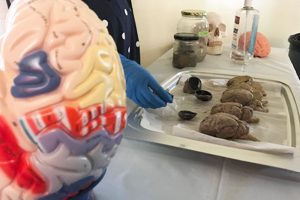Overcoming Brain Injury: Brain & Spine of Mine event
Posted on Dec 19, 2019 in Ola LokahiMany people don’t consider the possibility of suffering a traumatic brain or spinal cord injury. No one ever thinks it will happen to them. That’s what Kevin, Sepasi, Bill, Ann and Mark thought—but they were wrong.
These community members told their stories at the first-ever “Overcoming Injury: Brain and Spine of Mine” event on Nov. 17, at the Oahu Veterans Center. The event was hosted by the Department of Health Developmental Disabilities Division’s Neurotrauma Supports. Kevin was riding his bike through the woods when a massive tree fell on him. Sepasi slipped on a wet sidewalk. Bill and Ann were involved in motor vehicle related incidents. Mark was injured in a fall. Each of their lives changed forever.
But these individuals have experienced great healing and transformation despite or because of their injuries and joined in the support of others. Kevin became the first person with paraplegia to graduate from the U.S. Naval Academy, Sepasi began a new profession, Bill completely changed his outlook on life, and Ann and Mark competed in races at the highest level. The message of overcoming rang true as storytellers shared the pain and subsequent healing that came from their experiences.
In addition to hearing stories of hope and resilience, attendees also learned more about brain injury from neuroscientist Dr. Sheri Hiroi-Dubay, who shared a doctor’s perspective of patients with different brain injuries and demonstrated how the brain works with visual illusions. Participants even got to examine and hold actual sheep brains!
The event put families and community members in touch with exhibitors, including:
- Brain Injury Association of Hawaii
- Diana Ho Yoga
- Hawaii Bicycling League
- Hawaii Disability Rights Center
- Hui Malama Po‘o
- ‘Ōlelo Community Media
- Sheri Hiroi-Dubay Ph.D.
- University of Hawai‘i Mānoa College of Education Hawaii Concussion Awareness Management Program
The key messages were to protect your brain, seek medical assistance immediately when you are injured, and to know that while recovery can be difficult, it can also be transformative, and offer opportunities you never considered before.
Want to read more about people who overcame brain and spinal cord injuries? Check out these personal stories collected by the Developmental Disabilities Division Neurotrauma Supports:
